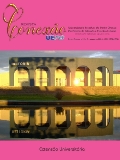BUILDING A HEALTHIER COMMUNITY: EDUCATIONAL PROJECT ON THE RATIONAL USE OF MEDICINES IN AN EDUCATION CENTER OF ELEMENTARY AND SECONDARY LEVELS IN ARGENTINA - DOI: 10.5212/Rev.Conexao.v.12.i3.0002
DOI:
https://doi.org/10.5212/Rev.Conexao.v.12.i3.0002Keywords:
Educational Project, Rational Use of Medicines, EducatioN Center, Argentina.Abstract
Educational activities, developed with different teaching materials, were directed to issues related to the use of medicines, in order to teach and educate about their rational use in the project “Building a Healthier Community”. A workshop on “Rational Use of Medicines” was implemented with elementary (4th to 6th grade) and secondary (1st to 6th year) school students of an education center in Argentina. The theoretical aspects approached were applied through several games played by the students, such as dominoes, analysis of situations presented in a cartoon and discernment between positive and negative attitudes related to the use of medicines. Students showed great involvement with the activities proposed and a great change in the perception of medicines was seen with more awareness of the importance of proper use of medicines. These activities aimed at helping to change the scenario of irrational use of medicines that currently exists in several areas of our population.
Downloads
References
BERRÍOS VALENZUELA, Llarela; BUXARRAIS ESTRADA, María Rosa. Educación para el consumo: aproximación empírica a los hábitos de consumo del alumnado de secundaria. Revista Electrónica Actualidades Investigativas en Educación 15 (1): 1-24; 2015.
CHAPLIN, Lan Nguyen; JOHN, Deborah. Interpersonal influences on adolescent materialism: A new look at the role of parents and peers. Journal of Consumer Psychology 20: 176-184; 2010.
CHAPLIN, Lan Nguyen; LOWREY, Tina. The Development of Consumer-Based Consumption Constellations in Children. Journal of Consumer Research 36 (5): 757-777; 2010.
FLOURI, Eirini. An integrated model of consumer materialism: Can economic socialization and maternal values predict materialistic attitudes in adolescents? Journal of Socio-Economics 28 (6): 707–724; 1999.
GARCÍA V; MARQUINA I; OLABARRI A; MIRANDA G; RUBIERA G; BAENA MI. Resultados negativos asociados con la medicación en un servicio de urgencias hospitalario. Farmacia Hospitalaria 32 (3): 157-162; 2008.
HEPLER, Charles D; STRAND, Linda M. Oportunidades y responsabilidades en la Atención farmacéutica. Pharmaceutical care España 1 (1): 35-47; 1999.
Organización Mundial de la Salud. The Rational Use of Drugs. Report of the Conference of Experts. Ginebra, OMS, 1985
OPS (Organización Panamericana de la Salud). Manual para la enseñanza de uso racional de medicamentos a la comunidad. Ministerio de Salud de Perú, Dirección General de Medicamentos, Insumos y Drogas, Organización Panamericana de la Salud, 2005.
PÉREZ MENÉNDEZ-CONDE, C; BERMEJO VICEDO, T; DELGADO SILVEIRA, E; CARRETERO ACCAME, E. Resultados negativos asociados al uso de medicamentos que motivan ingreso hospitalario. Farmacia Hospitalaria 35 (5): 236-243; 2011.
QUENEAU, Patrice; BANNWARTH, Bernard; CARPENTIER, Françoise; GULIANA, Jean-Michel; BOUGET, Jacques; TROMBERT, Béatrice; LEVERVE, Xavier; LAPOSTOLLE, Frédéric; BORRON, Stephen; ADNET, Frédéric. Emergency Department Visits Caused by Adverse Drug Events. Drug Safety 30 (1): 81-88; 2007.
SANTAMARÍA-PABLOS, A; REDONDO-FIGUERO, C; BAENA, MI; FAUS, MJ; TEJIDO, R; ACHA, O; NOVO, MJ. Resultados negativos asociados con medicamentos como causa de ingreso hospitalario. Farmacia Hospitalaria 33 (1): 12-25; 2009.
Downloads
Published
Issue
Section
License
a) Authors retain copyright and grant the journal right of first publication with the work simultaneously licensed under a Creative Commons Attribution License that allows others to share the work with an acknowledgement of the work's authorship and initial publication in this journal.
b) By submitting an article to the Revista Conexão UEPG and having it approved, the authors agree to assign, without compensation, the following rights to the Journal: the rights of first publication and the rights to redistribute the article and its metadata to the indexing and reference services that the editors deem appropriate.
c) Readers are free to transfer, print out and use the articles published in the Journal, as long as there is always explicit mention to the author(s) and to the Revista Conexão UEPG and as long as there is no alteration of the original work. Any other use of the texts needs to be approved by the author(s) and by the Journal.






